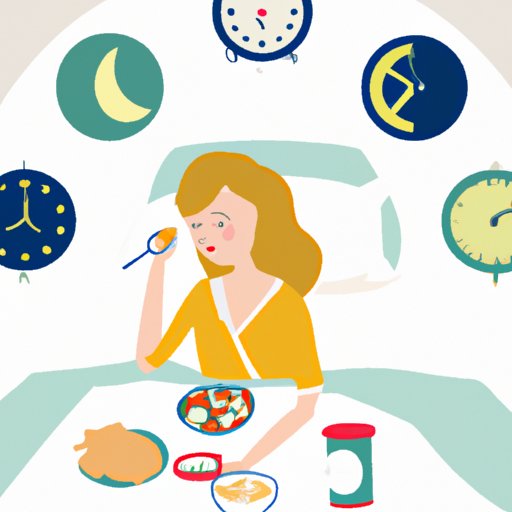Introduction
Eating before bed is a controversial topic. Some people believe that it can help improve sleep quality and provide other health benefits, while others argue that it can lead to weight gain and other negative effects. In this article, we’ll explore the pros and cons of eating before bed so you can make an informed decision about whether it’s right for you.
Exploring the Benefits and Risks of Eating Before Bedtime
Let’s start by taking a look at some of the potential benefits and risks associated with eating before bed.
Benefits of Eating Before Bed
Eating before bed can provide a number of potential benefits, including:
- Improved Sleep Quality: Eating a small snack before bed can help promote better sleep quality. A study conducted by the National Institutes of Health found that consuming a snack containing carbohydrates and protein before bed improved sleep quality, particularly in women.
- Increased Production of Growth Hormone: Eating before bed can also help increase the production of growth hormone, which is important for muscle growth and repair. According to a study published in the Journal of Clinical Endocrinology & Metabolism, consuming a snack containing carbohydrates and protein before bed increased growth hormone levels in men.
- Improved Digestion: Eating a light snack before bed can also help improve digestion. The body needs fuel to digest food properly, and eating a snack before bed can provide that fuel. A study published in the journal Gut found that eating a snack before bed improved digestion in people with irritable bowel syndrome.
Risks of Eating Before Bed
There are also some potential risks associated with eating before bed, including:
- Weight Gain: Eating before bed can lead to weight gain if you consume too many calories or unhealthy foods. Studies have shown that late-night snacking is linked to obesity, so it’s important to be mindful of portion sizes and choose healthy snacks.
- Heartburn: Eating before bed can also cause heartburn in some people. This is because lying down after eating can make it easier for stomach acid to travel up into the esophagus, causing discomfort. If you’re prone to heartburn, it’s best to avoid eating right before bed.
- Interrupted Sleep: Eating before bed can also lead to interrupted sleep. Eating too close to bedtime can lead to indigestion and discomfort, which can disrupt your sleep. It’s best to give your body at least two hours to digest your food before going to bed.
What Nutrients Should You Consume Before Bed?
If you decide to eat before bed, it’s important to choose foods that contain the right nutrients. Here are some of the nutrients you should look for in your pre-bed snacks:
- Protein: Protein is important for muscle growth and repair, so it’s a good idea to include some protein in your pre-bed snack. Good sources of protein include Greek yogurt, eggs, nuts, and nut butters.
- Complex Carbs: Complex carbs help promote better sleep, so they’re a great addition to a pre-bed snack. Good sources of complex carbs include oatmeal, whole grain bread, and fruits and vegetables.
- Healthy Fats: Healthy fats are important for maintaining healthy blood sugar levels, so they’re a good choice for a pre-bed snack. Good sources of healthy fats include avocados, nuts, and seeds.
- Fiber: Fiber helps keep you feeling full, so it’s a good idea to include some fiber in your pre-bed snack. Good sources of fiber include fruits, vegetables, whole grains, and legumes.
Is Eating Before Bed Bad for Your Health?
Eating before bed isn’t necessarily bad for your health, but there are certain factors to consider. Here are some things to keep in mind when deciding whether to eat before bed:
- Timing: It’s best to give your body at least two hours to digest your food before going to bed. Eating too close to bedtime can lead to indigestion and disrupted sleep.
- Portion Size: It’s important to be mindful of portion sizes when eating before bed. Eating too much can lead to weight gain, so it’s best to stick to smaller portions.
- Type of Food: It’s also important to choose the right type of food. Avoid processed foods and stick to nutrient-dense, whole foods.

How to Make Healthy Choices When Eating Before Bed
If you decide to eat before bed, there are a few things you can do to make sure you’re making healthy choices. Here are some tips for making healthy choices when eating before bed:
- Choose High-Quality Foods: It’s important to choose high-quality, nutrient-dense foods. Stick to whole foods like fruits, vegetables, proteins, and healthy fats.
- Avoid Processed Foods: Avoid processed foods like chips, candy, and cookies. These foods are usually high in calories and low in nutrients, so they’re not a good choice for a pre-bed snack.
- Stick to a Schedule: Try to stick to a regular bedtime routine. This will help ensure that you’re getting enough rest and that you’re not eating too close to bedtime.
- Limit Portions: It’s also important to watch your portion sizes. Eating too much can lead to weight gain, so it’s best to stick to smaller portions.
Conclusion
In conclusion, eating before bed can have both positive and negative effects on your health. Eating a small snack before bed can help improve sleep quality and provide other health benefits, but it can also lead to weight gain and other negative effects. It’s important to make healthy choices when deciding whether to eat before bed, such as choosing high-quality foods, avoiding processed foods, sticking to a schedule, and limiting portions. By following these tips, you can make sure that your pre-bed snack is beneficial to your health.


